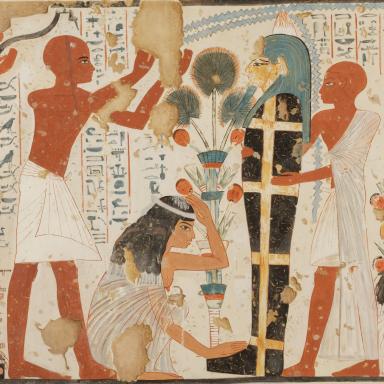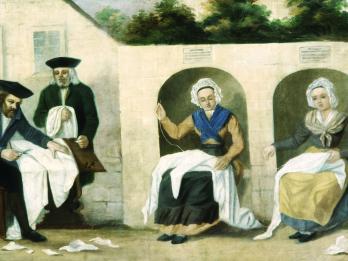Prologue (to Job)
Job 1:1–2:13
Biblical Period
Chaprer 1
1There was a man in the land of Uz named Job. That man was blameless and upright; he feared God and shunned evil. 2Seven sons and three daughters were born to him; 3his possessions were seven thousand sheep, three thousand camels, five hundred yoke of oxen and five hundred she-asses, and a very large household. That man was wealthier than anyone in the East.
4It was the custom of his sons to hold feasts, each on his set day in his own home. They would invite their three sisters to eat and drink with them. 5When a round of feast days was over, Job would send word to them to sanctify themselves, and, rising early in the morning, he would make burnt offerings, one for each of them; for Job thought, “Perhaps my children have sinned and blasphemed God in their thoughts.” This is what Job always used to do.
6One day the divine beings presented themselves before the Lord, and the Adversary came along with them. 7The Lord said to the Adversary, “Where have you been?” The Adversary answered the Lord, “I have been roaming all over the earth.” 8The Lord said to the Adversary, “Have you noticed My servant Job? There is no one like him on earth, a blameless and upright man who fears God and shuns evil!” 9The Adversary answered the Lord, “Does Job not have good reason to fear God? 10Why, it is You who have fenced him round, him and his household and all that he has. You have blessed his efforts so that his possessions spread out in the land. 11But lay Your hand upon all that he has and he will surely blaspheme You to Your face.” 12The Lord replied to the Adversary, “See, all that he has is in your power; only do not lay a hand on him.” The Adversary departed from the presence of the Lord.
13One day, as his sons and daughters were eating and drinking wine in the house of their eldest brother, 14a messenger came to Job and said, “The oxen were plowing and the she-asses were grazing alongside them 15when Sabeans attacked them and carried them off, and put the boys to the sword; I alone have escaped to tell you.” 16This one was still speaking when another came and said, “God’s fire fell from heaven, took hold of the sheep and the boys, and burned them up; I alone have escaped to tell you.” 17This one was still speaking when another came and said, “A Chaldean formation of three columns made a raid on the camels and carried them off and put the boys to the sword; I alone have escaped to tell you.” 18This one was still speaking when another came and said, “Your sons and daughters were eating and drinking wine in the house of their eldest brother 19when suddenly a mighty wind came from the wilderness. It struck the four corners of the house so that it collapsed upon the young people and they died; I alone have escaped to tell you.”
20Then Job arose, tore his robe, cut off his hair, and threw himself on the ground and worshiped. 21He said, “Naked came I out of my mother’s womb, and naked shall I return there; the Lord has given, and the Lord has taken away; blessed be the name of the Lord.”
22For all that, Job did not sin nor did he cast reproach on God.
Chaprer 2
1One day the divine beings presented themselves before the Lord. The Adversary came along with them to present himself before the Lord. 2The Lord said to the Adversary, “Where have you been?” The Adversary answered the Lord, “I have been roaming all over the earth.” 3The Lord said to the Adversary, “Have you noticed My servant Job? There is no one like him on earth, a blameless and upright man who fears God and shuns evil. He still keeps his integrity; so you have incited Me against him to destroy him for no good reason.” 4The Adversary answered the Lord, “Skin for skin—all that a man has he will give up for his life. 5But lay a hand on his bones and his flesh, and he will surely blaspheme You to Your face.” 6So the Lord said to the Adversary, “See, he is in your power; only spare his life.” 7The Adversary departed from the presence of the Lord and inflicted a severe inflammation on Job from the sole of his foot to the crown of his head. 8He took a potsherd to scratch himself as he sat in ashes. 9His wife said to him, “You still keep your integrity! Blaspheme God and die!” 10But he said to her, “You talk as any shameless woman might talk! Should we accept only good from God and not accept evil?” For all that, Job said nothing sinful.
11When Job’s three friends heard about all these calamities that had befallen him, each came from his home—Eliphaz the Temanite, Bildad the Shuhite, and Zophar the Naamathite. They met together to go and console and comfort him. 12When they saw him from a distance, they could not recognize him, and they broke into loud weeping; each one tore his robe and threw dust into the air onto his head. 13They sat with him on the ground seven days and seven nights. None spoke a word to him for they saw how very great was his suffering.
Credits
Published in: The Posen Library of Jewish Culture and Civilization, vol. 1.





